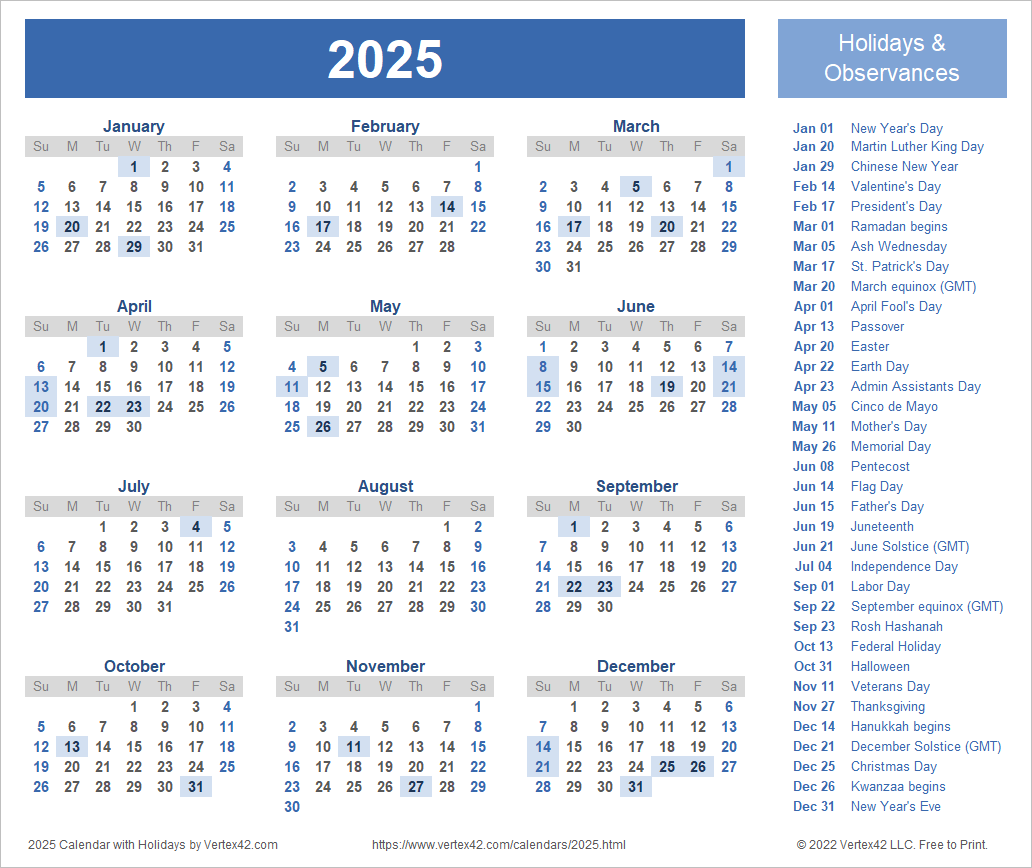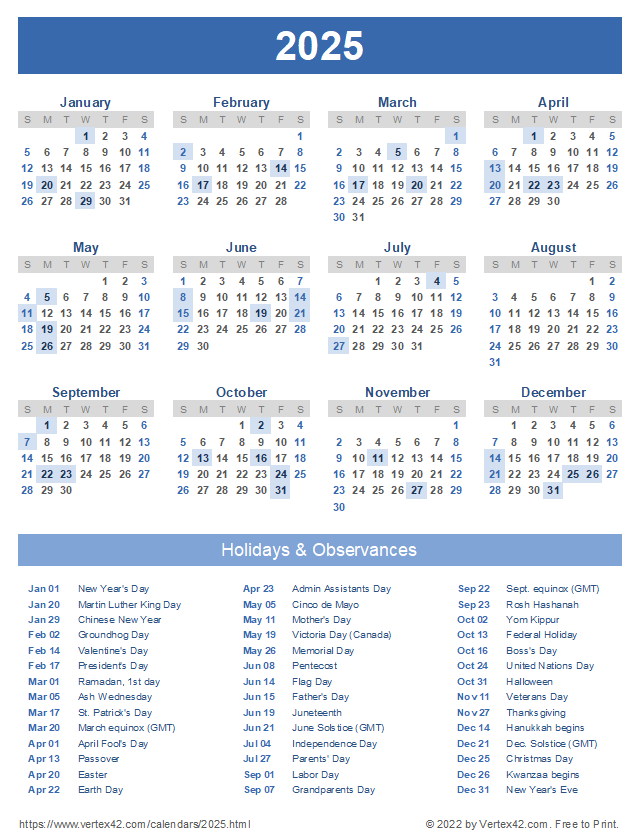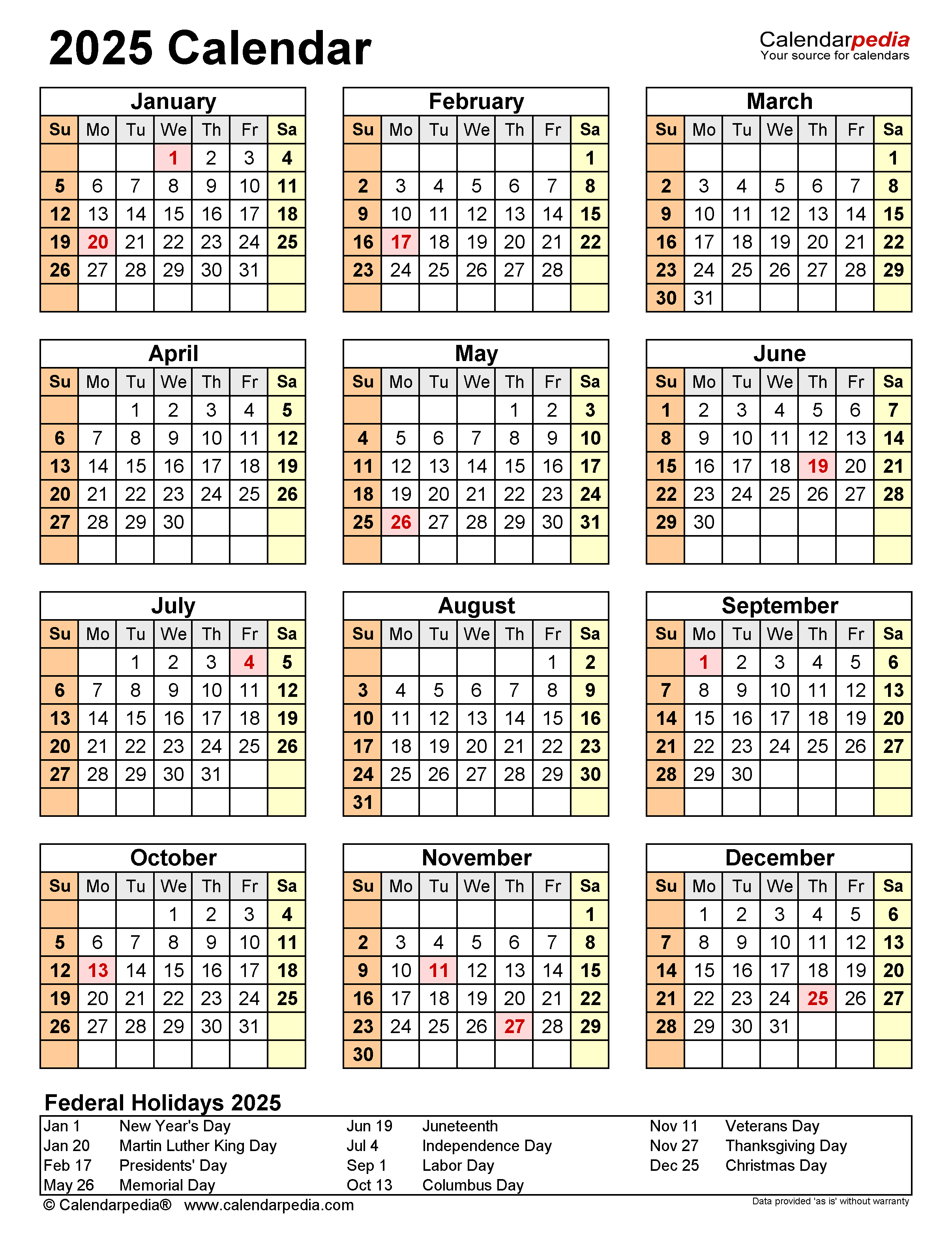2025 Holidays Calendar: A Comprehensive Guide To National, Religious, And Observance Holidays
2025 Holidays Calendar: A Comprehensive Guide to National, Religious, and Observance Holidays
Related Articles: 2025 Holidays Calendar: A Comprehensive Guide to National, Religious, and Observance Holidays
- Animated Calendario 2025: A Comprehensive Guide
- CPP Payment Dates 2025 Calendar
- 2025 Calendar Canada: A Comprehensive Overview
- 2025 Calendar Template Free Blank: Plan Your Year With Ease
- June 2026 Calendar With Holidays
Introduction
With great pleasure, we will explore the intriguing topic related to 2025 Holidays Calendar: A Comprehensive Guide to National, Religious, and Observance Holidays. Let’s weave interesting information and offer fresh perspectives to the readers.
Table of Content
Video about 2025 Holidays Calendar: A Comprehensive Guide to National, Religious, and Observance Holidays
2025 Holidays Calendar: A Comprehensive Guide to National, Religious, and Observance Holidays

Introduction
The year 2025 promises an array of holidays, both nationally recognized and culturally significant. From the bustling excitement of New Year’s Day to the serene observance of Good Friday, the calendar offers a diverse tapestry of days dedicated to celebration, remembrance, and reflection. This comprehensive guide provides an in-depth overview of the 2025 holidays calendar, highlighting key dates and their historical, cultural, and religious significance.
National Holidays
New Year’s Day (January 1)
Marking the beginning of a new year, New Year’s Day is a federal holiday celebrated with fireworks, parades, and resolutions. It symbolizes fresh starts and renewed hopes for the future.
Martin Luther King Jr. Day (January 20)
Honoring the legacy of the civil rights leader, Martin Luther King Jr. Day is a federal holiday observed on the third Monday of January. It commemorates his nonviolent approach to social change and his fight for racial equality.
Presidents’ Day (February 17)
Originally known as Washington’s Birthday, Presidents’ Day is a federal holiday observed on the third Monday of February. It celebrates the birthdays of George Washington and Abraham Lincoln, two of America’s most influential presidents.
Memorial Day (May 26)
A solemn day of remembrance, Memorial Day honors the men and women who died serving in the U.S. armed forces. It is observed on the last Monday of May with parades, ceremonies, and visits to military cemeteries.
Juneteenth (June 19)
Juneteenth commemorates the emancipation of enslaved African Americans in the United States on June 19, 1865. It is a federal holiday that recognizes the end of slavery and celebrates African American freedom and culture.
Independence Day (July 4)
A day of national pride and celebration, Independence Day marks the anniversary of the signing of the Declaration of Independence on July 4, 1776. It is celebrated with fireworks, barbecues, and patriotic displays.
Labor Day (September 1)
Labor Day recognizes the contributions of American workers and celebrates the labor movement. It is observed on the first Monday of September with parades, picnics, and speeches advocating for workers’ rights.
Columbus Day (October 13)
Columbus Day commemorates the arrival of Christopher Columbus in the Americas in 1492. It is a federal holiday observed on the second Monday of October, although its historical significance and the legacy of Columbus are often debated.
Veterans Day (November 11)
Honoring all who have served in the U.S. military, Veterans Day is observed on November 11. It is a day of remembrance, gratitude, and support for veterans and their families.
Thanksgiving Day (November 27)
A time for family gatherings and gratitude, Thanksgiving Day is a federal holiday observed on the fourth Thursday of November. It traces its roots to the Pilgrims’ harvest feast in 1621 and is celebrated with traditional meals, parades, and football games.
Christmas Day (December 25)
A widely celebrated Christian holiday, Christmas Day commemorates the birth of Jesus Christ. It is observed with religious services, gift exchanges, and festive decorations.
Religious Holidays
Ash Wednesday (February 26)
Ash Wednesday marks the beginning of Lent, a 40-day period of fasting and penance in the Christian tradition. It is observed with the imposition of ashes on the forehead as a reminder of mortality and the need for repentance.
Good Friday (April 11)
Good Friday commemorates the crucifixion of Jesus Christ. It is a day of mourning and reflection in the Christian tradition, often observed with church services and fasting.
Easter Sunday (April 13)
Easter Sunday celebrates the resurrection of Jesus Christ. It is the most important holiday in the Christian calendar and is marked with religious services, egg hunts, and family gatherings.
Rosh Hashanah (September 25-26)
Rosh Hashanah is the Jewish New Year, marking the beginning of the High Holy Days. It is observed with prayers, feasting, and the sounding of the shofar, a ram’s horn.
Yom Kippur (October 4-5)
Yom Kippur is the holiest day in the Jewish calendar. It is a day of fasting, prayer, and repentance, and is observed with synagogue services and a 25-hour fast.
Diwali (November 11)
Diwali, also known as the Festival of Lights, is a Hindu festival that celebrates the victory of good over evil. It is observed with fireworks, prayers, and family gatherings.
Observance Holidays
Groundhog Day (February 2)
Groundhog Day is a popular tradition that predicts the arrival of spring. According to folklore, if a groundhog sees its shadow on this day, winter will last another six weeks.
Valentine’s Day (February 14)
Valentine’s Day is a day to celebrate love and romance. It is observed with gift exchanges, romantic dinners, and expressions of affection.
Earth Day (April 22)
Earth Day is an international event that raises awareness about environmental issues and promotes sustainable practices. It is observed with educational events, cleanups, and calls to action.
Mother’s Day (May 11)
Mother’s Day is a day to honor mothers and celebrate their contributions to society. It is observed with gift exchanges, family gatherings, and expressions of gratitude.
Father’s Day (June 15)
Father’s Day is a day to honor fathers and celebrate their roles in families. It is observed with gift exchanges, family gatherings, and expressions of appreciation.
Halloween (October 31)
Halloween is a popular holiday that originated in Celtic traditions. It is observed with costumes, trick-or-treating, and festive decorations.
Conclusion
The 2025 holidays calendar offers a diverse array of opportunities to celebrate, remember, and reflect. From the national pride of Independence Day to the religious significance of Easter and Yom Kippur, these holidays provide a tapestry of cultural, historical, and spiritual experiences. By understanding the origins and significance of these holidays, we can deepen our appreciation for the richness and diversity of our shared human experience.








Closure
Thus, we hope this article has provided valuable insights into 2025 Holidays Calendar: A Comprehensive Guide to National, Religious, and Observance Holidays. We appreciate your attention to our article. See you in our next article!